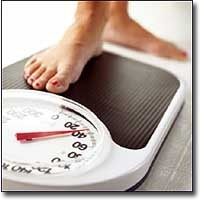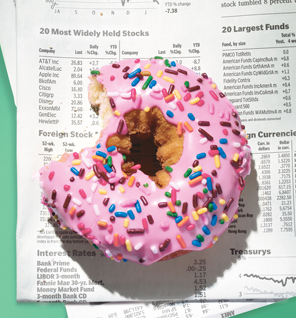Lack of money makes people grab for cheap foods. Unfortunately for us, fast food restaurants have included the almighty “dollar menu.” Most of these items are the worst for you! If you are cooking your food at home; starchy foods such as pasta tend to be cheap. However, eating high carbohydrate meals can lead to weight gain. Meat products are much more expensive however, they keep us full, lean, and balance out the carbs in our diet.
The stress of this recession has increased the need to “self medicate.” Foods high in sugar and carbohydrates give us comfort in our time of need yet send our scale soring to new hieghts. Self Magazine’s April issue gave our readers at Fit Tip Daily the exclusive first peak at this article. Take control of your weight and use Self’s solutions to gain control of your body!!
Fannie Mae and Freddie Mac have a co-conspirator in the war on your well-being: Duncan Hines. During stressful times, overeating is practically our national therapy. In fact, nearly 50 percent of people say they soothe frayed nerves with unhealthy meals, according to a survey by the American Psychological Association in Washington, D.C. Ultimately, calorie overload—and the weight that results—only adds to our feelings of helplessness.
The solution: Take control of your diet. “You don’t have power over the financial markets, but you have complete autonomy when it comes to your eating,”says Heather Bauer, R.D., of New York City. Curbing your binges will also give you a sense of confidence—which may carry over to how you handle your finances. We found four women in dire need of diet makeovers and helped them learn to manage financial stress without Mallomar meltdowns. Read on for their winning strategies.
The stress gobbler
Emily Stern, 28, editor in New York City
Pounds gained since the market tanked: 15
Carb-heavy suppers calmed Stern while her company downsized but cost her a jeans size. And although she kept her job, she inherited the work of her laid-off colleagues. “After a long day, I’ll watch TV while noshing on cheese and have a big spaghetti dinner.”Plan for pasta.
Stern craves carbs at night because they lift serotonin levels—which makes her feel relaxed, Bauer says. Rather than ditch carbs altogether, Stern should seek balance, Bauer suggests, by choosing protein-and-produce-based breakfasts and lunches and saving healthy carbs such as brown rice or whole-wheat bread for dinner. “It’s easier to resist temptation in the morning, and you’ll want the comfort at night,” Bauer says. Plus, including lean protein such as dairy, fish, beans or tofu at every meal will fill her up, so she’ll eat smaller portions of starch.
Limit your triggers.
Finding a relaxing, unplugged postdinner activity such as reading, journaling or taking a walk may help Stern say good-bye to her late-night snack habit, which is tied to television watching, says Jennifer Louden, a personal coach on Bainbridge Island, Washington. Stern can also fill her fridge with portion-controlled versions of her favorite snacks. A Laughing Cow Mini Babybel Light (50 calories, 3 grams fat) will satisfy her hankering for cheese without completely blowing her calorie budget.
The cheap eater
Paige Donner, 41, writer in Los Angeles
Pounds gained since the market tanked: 15
Unsteady pay and fewer assignments have turned this freelance journalist into a bona fide food bargain hunter. “I’m buying whatever organic food is on sale, whether it’s healthy or not,” she says. “Last night I was making macaroni and cheese, thinking, Am I so broke that I’m really eating this?” Donner also often goes nearly all day without eating. “I won’t plan ahead and then realize it’s been eight hours since my last meal, but stopping for a green salad seems too expensive.”* To read the rest of this excellent article, visit Self.com
Adria Ali
(CES, PES, CPT, BS)



Leave a Reply